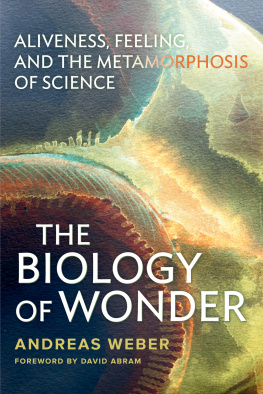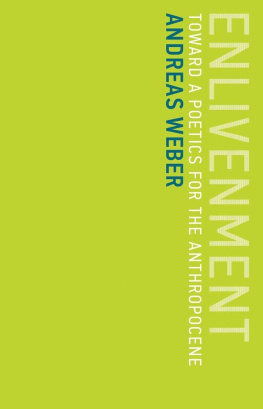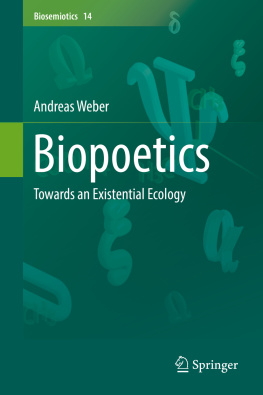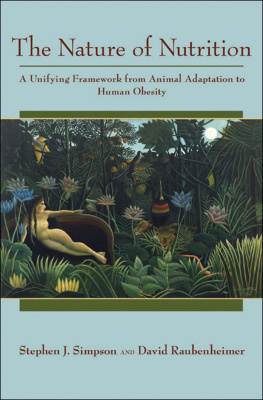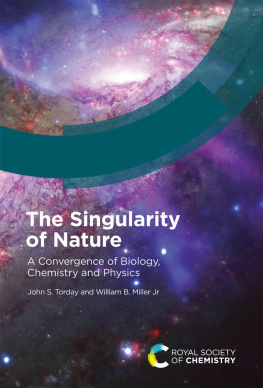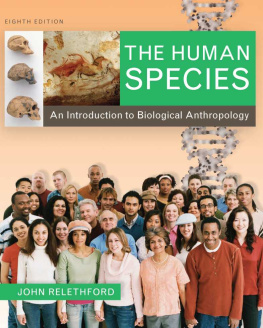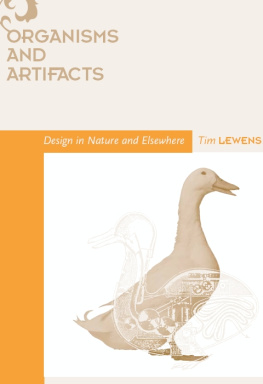Praise for
The Biology of Wonder
The Biology of Wonder is a wonderfully eclectic and wide-ranging book that clearly shows that all beings and landscapes on our fascinating and magnificent planet are deeply interconnected. In the spirit of personal rewilding, Professor Weber writes about interbeing, ecological commons, first-person ecology, and non-duality in ways that will make sense to readers with different interests, and his ideas about poetic ecology show clearly that we are not alone indeed, we are one of the gang and must not behave as if we are the only show in town.
MARC BEKOFF, University of Colorado, and author, Rewilding Our Hearts: Building Pathways of Compassion and Coexistence
Weber moves biology beyond reductionism into a new expanded view of life that includes not only reductionism itself, but also the interactive cooperation, beauty, and vital force that complete the picture of our living world.
DAVID EHRENFELD, Distinguished Professor of Biology at Rutgers, and author, The Arrogance of Humanism and Becoming Good Ancestors: How We Balance Nature, Community, and Technology
The Biology of Wonder is a wonder. Schrodinger asked What is Life with brilliance, but misses What IS life. Weber sees aliveness as functional wholes, self-creative, and self-generating, that co-create their worlds. The aliveness of all life, emotional, sentient, adgentival, interested, co-mingled, entangled with all of life, reorients us scientifically, poetically and morally, from the rich but insufficient reductionism Schrodinger helped spearhead.
STUART KAUFFMAN FRSC, Emeritus Professor, University of Pennsylvania
Written with poetic elegance and interwoven with a rich vein of personal narrative, this extraordinary book takes the central idea of the subjectivity and interior life of all living beings and gives it concreteness by grounding it in the findings of modern biology. In articulating the Laws of Desire inherent in all organic life, it goes far toward reframing the debate about the relationship between mind and body.
SHIERRY WEBER NICHOLSEN, author, The Love of Nature and the End of the World
In Andreas Webers vision, nature is beautiful, and ecology is poetry. Follow his beautiful words into a science that investigates the Earth as a breathing, sensitive planet that welcomes us with story and song.
DAVID ROTHENBERG, author, Survival of the Beautiful and Bug Music
The Biology of Wonder guides us toward discerning that value, meaning, experience, creativity, and freedom exist within and constitute the living world. Previously dismissed as romantic, this viewpoint, at once clearheaded and compassionate, is tenaciously represented by Andreas Weber as deep realism. To come to grips with the understanding he communicates to recognize the ubiquity of subjectivity in the world and the feeling-unity of the human with all creation is to glimpse what biodiversity destruction heralds for the human soul. The work of protecting and restoring nature simultaneously recovers and rescues our innermost being.
EILEEN CRIST, coeditor, Keeping the Wild: Against the Domestication of Earth.
The Biology of Wonder is a wonderful biology, even a transformational one. Prof. Weber leads us into a radiant world which is sensuous, interconnected and always communicating in a bio-poetical symphony. Had we ears to hear the language and eyes to see the vision revealed in this book we would surely be made more alive and deeply thankful. This is more than a book; it is a revelation, and it joins the very few works I would take into the wilderness with me. Beautiful, wise, and grounded, I am grateful as much for the vision Prof Weber elucidates as for the love with which he clearly expresses it all.
KALEEG HAINSWORTH, author, An Altar in the Wilderness
Grounded in science, yet eloquently narrated, this is a groundbreaking book. Webers visionary work provides new insight into human/nature interconnectedness and the dire consequences we face by remaining disconnected.
RICHARD LOUV, author, The Nature Principle and Last Child in the Woods
Copyright 2016 by Andreas Weber.
All rights reserved.
Cover design by Diane McIntosh. Watercolor image istock -stereotype
Printed in Canada. First printing January 2016.
Paperback ISBN: 978-0-86571-799-2 eBook ISBN: 978-1-55092-594-4

Inquiries regarding requests to reprint all or part of The Biology of Wonder should be addressed to New Society Publishers at the address below. To order directly from the publishers, please call toll-free (North America) 1-800-567-6772, or order online at www.newsociety.com
Any other inquiries can be directed by mail to:
New Society Publishers
P.O. Box 189, Gabriola Island, BC V0R 1X0, Canada
(250) 247-9737
LIBRARY AND ARCHIVES CANADA CATALOGUING IN PUBLICATION
Weber, Andreas, 1967
[Alles fhlt. English]
The biology of wonder: aliveness, feeling, and the
metamorphosis of science / Andreas Weber.
Translation of: Alles fhlt.
Includes bibliographical references and index.
Issued in print and electronic formats.
ISBN 978-0-86571-799-2 (paperback).ISBN 978-1-55092-594-4 (ebook)
1. Life (Biology). 2. Nature. 3. Emotions. 4. Human ecology.
5. Life sciences. I. Title. II Tile: Alles fhlt. English
QH501.W4213 2016 | | C2015-906818-5
C2015-906819-3 |
|---|
New Society Publishers mission is to publish books that contribute in fundamental ways to building an ecologically sustainable and just society, and to do so with the least possible impact on the environment, in a manner that models this vision. We are committed to doing this not just through education, but through action. The interior pages of our bound books are printed on Forest Stewardship Council-registered acid-free paper that is 100% post-consumer recycled (100% old growth forest-free), processed chlorine-free, and printed with vegetable-based, low-VOC inks, with covers produced using FSC-registered stock. New Society also works to reduce its carbon footprint, and purchases carbon offsets based on an annual audit to ensure a carbon neutral footprint. For further information, or to browse our full list of books and purchase securely, visit our website at: www.newsociety.com

To Emma
T hinking of that early spring day when you had been walking your black poodle and returned so enthusiastically. You told me that you had suddenly seen the flat sandhill with its scattered oak trees behind our house all ablaze with beauty.
The lower animals, like man, manifestly feel pleasure
and pain, happiness and misery.
Charles Darwin
All is allegory. Each creature is key to all other creatures.
J. M. Coetzee
The conscious subject is not really perceiving until it
recognizes itself as part of what it perceives.
Northrop Frye
Contents
Foreword by David Abram
From Enlightenment to Enlivenment
T he book you now hold in your hands is a living thing. Like many living entities, it is intemperate, moody, calm and collected at some moments, filled with passion and exuberance at others. Indeed this book is so brimming with vitality that, if youre not careful, you might find it wriggling free of your grasp and slithering off into the grass. The chapters herein pulse with wonder and are shadowed with ache; the pages are thick with fresh insights and often suffused with a kind of careless beauty.
Next page
